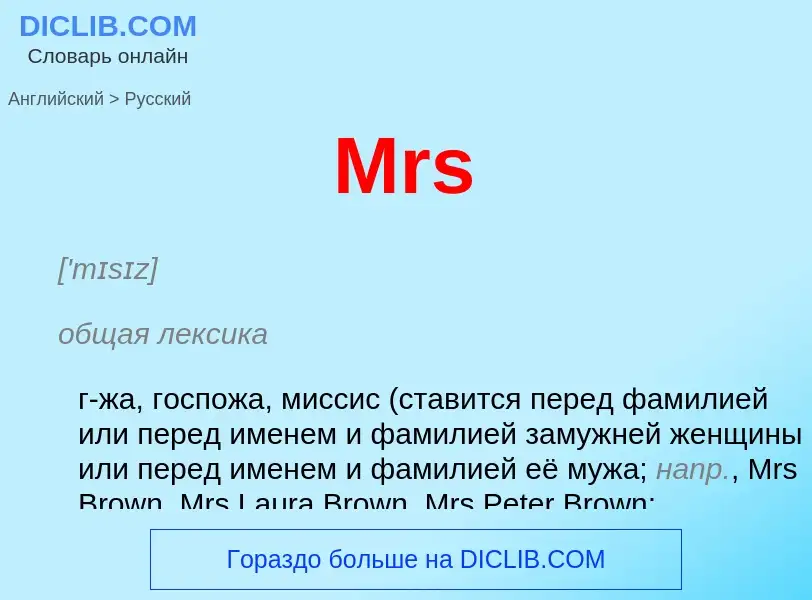Traduction et analyse de mots par intelligence artificielle ChatGPT
Sur cette page, vous pouvez obtenir une analyse détaillée d'un mot ou d'une phrase, réalisée à l'aide de la meilleure technologie d'intelligence artificielle à ce jour:
- comment le mot est utilisé
- fréquence d'utilisation
- il est utilisé plus souvent dans le discours oral ou écrit
- options de traduction de mots
- exemples d'utilisation (plusieurs phrases avec traduction)
- étymologie
Mrs - traduction vers Anglais
['mɪsɪz]
общая лексика
г-жа, госпожа, миссис (ставится перед фамилией или перед именем и фамилией замужней женщины или перед именем и фамилией её мужа; напр., Mrs Brown, Mrs Laura Brown, Mrs Peter Brown; последняя форма принята в официальной переписке и в тех случаях, когда речь идёт об обоих супругах; напр., Mr and Mrs Peter Brown или Dr and Mrs James Smth; Разведённые женщины, сохранившие фамилию мужа, ставят Mrs перед своим именем, напр., Mrs Laura Brown; Часто вдовы и работающие женщины пишут своё имя так же. Без фамилии не употр.)
существительное
общая лексика
миссис, госпожа
синоним
медицина
магнитно-резонансная спектроскопия
сокращение
[malfunction reporting system] система сигнализации о нарушении работоспособности
[mechanical repair shop] мастерская по ремонту механического оборудования
['misiz]
общая лексика
([сокр.] от Mistress)
миссис
госпожа (ставится перед фамилией замужней женщины)
сокращение
of mistress
Définition
Wikipédia
Mrs. (Modern English) or Mrs (British English; standard English pronunciation: MISS-iz) is a commonly used English honorific for women, usually for those who are married and who do not instead use another title (or rank), such as Doctor, Professor, President, Dame, etc. In most Commonwealth countries, a full stop (period) is usually not used with the title. In the United States and Canada a period (full stop) is usually used (see Abbreviation).
Mrs. originated as a contraction of the honorific Mistress (the feminine of Mister or Master) which was originally applied to both married and unmarried women in the upper class. Writers who used Mrs for unmarried women include Daniel Defoe, Samuel Richardson, Henry Fielding, and Samuel Johnson. The split into Mrs. for married women and Miss for unmarried began during the 17th century, but was not reliable until well into the 19th century.
It is rare for Mrs. to be written in a non-abbreviated form, and the unabbreviated word lacks a standard spelling. In literature it may appear as missus or missis in dialogue. A variant in the works of Thomas Hardy and others is "Mis'ess", reflecting its etymology. Misses has been used but is ambiguous, as this is a commonly used plural for Miss. The plural of Mrs. is from the French: Mesdames. This may be used as is in written correspondence, or it may be abbreviated Mmes.

